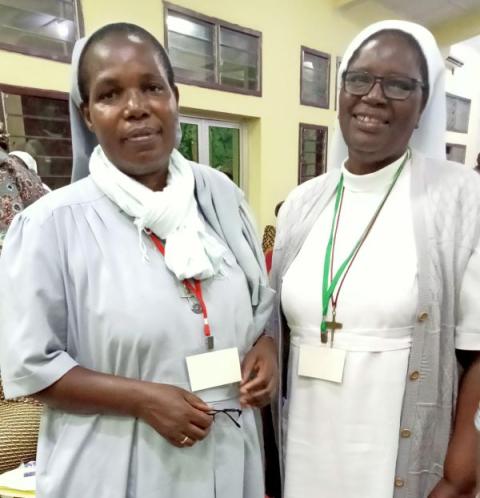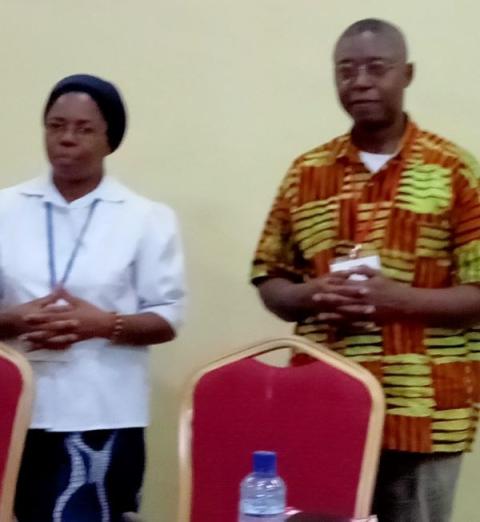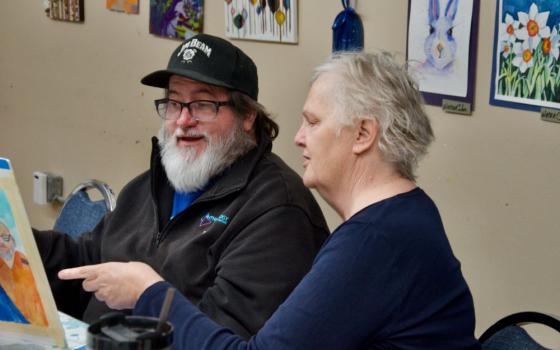I am a Missionary Sister of the Precious Blood from Kenya, on mission to the Democratic Republic of Congo. As superior of my region, I attended the meeting of the Conference for Religious in early October. Both women and men major superiors were present because we were there to vote on a directive by the Congregation of Institutes of Consecrated Life and Societies of Apostolic Life to combine the women's and men's conferences into one conference.
Apparently, this directive is being circulated among national and continental conferences of women and men religious. The Association of Consecrated Women of East and Central Africa (ACWECA) reported from their August meeting that they received a similar directive, and will be denied recognized status as a church organization unless they admit men. The DRC is a huge country with six ecclesiastical provinces, home to many local and international congregations of sisters and priests and brothers.
Our conferences are held every three years, and members try to attend because we find both support and challenge in being together and discussing issues we are facing in our local and national areas. We also enjoy celebrating prayer and entertainment.
The most significant decision at this meeting was to combine the men's and women's conferences into one conference. That proposal was created by a committee in response to the 2017 directive from the Congregation of Institutes of Consecrated Life and Societies of Apostolic Life. The two conferences reviewed the proposed new statutes for two days, and after some corrections and additions, the assembly approved them. The new organization is called the Conference of Major Superiors of the Democratic Republic of Congo.

Sr. Anastasie Nyazira (left) and Sr. Mary Paul Wamatu attended the Conference for Religious held in the Democratic Republic of the Congo in early October. (Mary Paul Wamatu)
The statutes say that if a male president is elected, the vice president will be a woman, and vice versa. Both will serve three-year terms. The president and vice president — together with the presidents and vice presidents of the six provinces — will make up the Council of Directors.
The elections of Jesuit Fr. Rigobert Kyungu and Pauline Sr. Rita Yamba were carried out fairly. However, during the election I noticed an underlying feeling in the group — among both women and men — that a male president would be better. And I was surprised at how the idea of combining the two conferences seemed so readily acceptable to the group.
I personally found it hard to embrace the change because of past experience with such combined conferences, in which the male religious would leave the work up to the women, and yet wanted control of elected positions. I fear that this merging of the two groups takes away a forum where sisters can address their issues plainly without feeling judged or suspected. I wonder if it could also become a way of keeping women religious under control. In mixed groups they often do not feel free to share their ideas and remain united as a group. I was surprised to find the majority of sisters present were content with the idea, but there was no way I could check this out.
The meeting opened with Mass focused on the feast of St Francis of Assisi. The bishop in charge of religious life in the archdiocese — Oscar Ngoyi, primary celebrant — emphasized that like Francis, we are all called to leave everything behind and to follow Christ as free persons to bring Christ's mercy and peace to the poor. After Mass, he spoke on Fratelli Tutti, applying it to our life here in the DRC, where we face constant political tensions.

Sr. Rita Yamba and Jesuit Fr. Rigobert were elected vice president and president, respectively, of the new Conference of Major Superiors of the Democratic Republic of Congo. (Mary Paul Wamatu)
Listening to the reports from each of the six ecclesiastical provinces was for me the most interesting and yet the most painful part of the conference. We heard of wonderful accomplishments of both women and men religious in very trying situations of civil wars, displacement of hundreds of people, loss of property, burned and deserted villages, and the constant fear of bandits. The eruption of the Nyiragongo volcano in May was another great challenge.
Daughter of Charity Sr. Anastasie Nyazira reported how their convent and guest house were completely buried in volcanic ash in Goma, making it impossible to rescue many furnishings. People around them were suffering; some were buried under the lava and others died from inhalation of volcanic gases. On another occasion, bandits stole everything from their convent, leaving them with only the clothes they were wearing.
Destroyed infrastructure is another challenge. It now takes superiors many days to reach their communities. Sometimes they must travel 300-400 kilometers on motorbikes and then cross rivers in boats or canoes — not just once, but several times. One superior shared that it takes two weeks to reach Kinshasa from her remote area and it might cost more than $1,000.
We also heard about how many had suffered from the COVID-19 pandemic; especially painful were the deaths of members, and the loss of income for communities that depend on tuition fees from schools and retreat centers. We heard of families unable to market their products and others who lost jobs, leaving their families hungry and vulnerable. Some described the huge numbers of students dropping out due to school closures, with the resulting loss of fees. Once schools could reopen, it has been hard for them to regain interest in education after being out so long. Students have lost a sense of self-esteem and too many have found themselves with early pregnancies.
Along with the stories of disaster, we fortunately heard stories of resilience. In spite of great loss, imbued with their charisms and spirituality, these women and men religious find all kinds of reasons to celebrate God's love and to share it with the people around them. They still have young women and men making vows, being ordained and celebrating the Day of Consecrated Life on Feb. 7.
So, the meeting held disappointment for me but also a sense of gratitude and joy in being a religious. Our country faces many challenges, but Gospel life is strong, not only among religious but among the people we serve. We do ask for prayers that our country will find ways to become peaceful once again.
Advertisement







